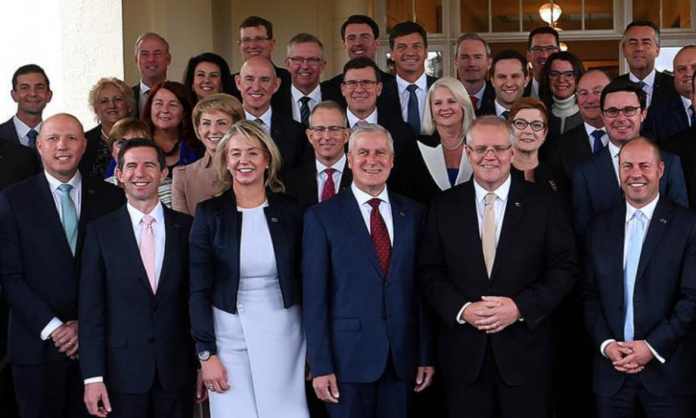Brittany Higgins’ account of being raped in Parliament House by a fellow Liberal Party staffer will come as no surprise to anyone unlucky enough to have encountered a pack of drunk young Liberals on a night out. Nor the cover-up. Nor the subsequent revelations about the alleged rape of a 16-year-old woman in 1988 by a current government minister. Such incidents are entirely in keeping with the values and political outlook that underpin the odious culture of the right.
Scott Morrison, whose culpability in this case is second only to the alleged rapist, is a good example. Aside from the chronically gullible, no-one believes the prime minister to have been ignorant of the events of 22-23 March 2019. Nor can his callous disinterest in the welfare of the victim and lack of concern about the internal culture that contributed to the assault be explained simply by his desire to avoid an electorally damaging story weeks out from an election, disgraceful though that calculation is.
It is also a matter of politics. Behind the studied blandness that dominates Morrison’s political persona—and which has served his ambition well—is a hard-right culture-wars warrior. This is a man who admitted sending his children to a private Baptist school in order to avoid them being exposed to a version of the Victorian government’s Building Respectful Relationships program, a program that makes his “skin crawl”, according to a 2018 interview. This skin-crawling program aims to “educate young people about the impact of gender-based violence [with a focus] on the key themes of gender, respect, violence and power”, something Morrison might, in retrospect, have done better to look into further rather than denounce.
Morrison is also a member of the Hillsong-affiliated Horizon Church, which promotes a particularly reactionary brand of sexual politics. Hillsong co-founder Bobbie Houston, for example, is the author of “Kingdom Women Love and Value their Sexuality” (also available in CD set) which contains tips for Christian women to be more attractive, thin and sexually pleasing to their husbands.
Morrison’s response to Higgins’ accusation demonstrates these values in action: by his own admission, it was only with reference to his daughters that Morrison was able to sympathise with Higgins and summon up antagonism towards the accused rapist. His many women colleagues in parliament, or indeed any other women at all, apparently failed to prompt such reflection. The message: women deserve empathy, can be made sense of as human beings, only in the context of the nuclear family. Outside of that, they’re on their own. If you dare to forge a path other than submission to a husband, dutiful housekeeping, dressing modestly and abstaining from sex before marriage, be prepared to accept the inevitable consequences.
It was these same conservative values that were mortally threatened by marriage equality reform in 2017—the adoption of which was so repulsive to Morrison he couldn’t stand even to be present in parliament when the vote was taken, instead huddling somewhere clutching rosaries and cursing in tongues with fellow cranks Tony Abbott, Kevin Andrews, George Christensen and Barnaby Joyce.
The slogan Morrison promoted at that time tells you a lot about the right: “It’s OK to vote no”—as if it is the homophobes who run the country and make the laws who are the persecuted victims rather than long-maligned and marginalised LGBTI people.
This trope—of traditional conservative values being under siege from Marxist radicals and their liberal dupes—is an important theme cohering the right. It justifies the aggressive defence of tradition, and the disparaging of any challenge to it, that is the essence of the culture-war right’s belligerent sensibility. Ostentatiously causing offence—like loudly singing “God Save the Queen” during the acknowledgement of country at the opening of National Union of Students conferences, as is the standard practice of young Liberals—is a rite of passage into this self-righteous, die-before-you-apologise culture. This evolves into the more acceptable family values and veneration of a no-nonsense “middle Australia” in the world of adult politics, but the feral young Liberal is never far away.
And it is in the area of gender and sexuality where this reaches a peak—namby-pamby hand-wringers worried about consent, equality, respect and other anti-family preoccupations of inner city elites are an existential threat to the God-ordained order of things, and to defy them is a badge of honour. In-your-face brutishness on the part of men and the unapologetic affirmation of sexist norms by women thus become an expression of political allegiance and their celebration a matter of loyalty. It’s no wonder those blooded in this culture emerge out the other side with appalling attitudes to women, whether that’s reflected in their direct interactions or in indifference to those of their colleagues.
Of course, chauvinistic attitudes do not alone account for the prevalence of sexual assault. But a group identity forged in opposition to the agenda of pro-women, “social justice warriors” can only make sexual abuse, and toleration of it, more likely. This is especially the case given that power in capitalist society consists in large part of the ability to control other people—to make them work for you on set terms, carry out your bidding in parliaments, serve you at home and accede to your every desire, no matter how reprehensible. Enthusiasm for capitalism, and an unapologetic desire to share in the power and privilege control of wealth confers, are foundational principles of the Liberal Party and broader right. It is no big leap then to assume that seniority in a hierarchy brings with it the right to abuse and control those below with impunity, even if that sometimes puts you on the wrong side of nanny-state laws.
This is not, then, just a matter of male privilege, as some commentators have reduced it to. Sexist attitudes and conduct comprise one piece of the larger puzzle that coheres the right, a significant proportion of whom are women. The minister most directly involved, for instance, is a woman, as is Higgins’ subsequent employer, employment minister Michaelia Cash. Both ministers failed to act on their knowledge of the incident with the urgency and seriousness it deserved, despite being women. And then there are the many right-wing women, including the supposedly more moderate Amanda Vanstone, who have gone out of their way to defend, make excuses for or promote identification with the alleged rapist and the actions of those who have covered it up.
It is not the desire to protect male privilege that commands loyalty from these women. It is the broader vision of the right, one that they subscribe to, within which sexism is a necessary and acceptable part. That vision is one where traditional institutions like the family and church are respected and obeyed, and the status quo protected as the natural order of things. Where authority, whether in the workplace or in relation to the state, is respected. And where power confers legitimacy, a legitimacy that stands above whingeing women, resentful Indigenous people or other vexatious ingrates with ideas above their stations. The right’s collective opposition to and determination to discredit the forces that challenge the sacred ideologies and institutions of capitalism, like the oppressed, the organised left, the union movement and outspoken liberals, is a powerful unifying force against which transgressions on their own side, however unedifying, simply do not rate.
The threat the right is so paranoid about—revolutionary Marxism with its radical gender ideology—is indeed a challenge to this world view. Marxism proudly opposes reactionary gender norms that reinforce women’s oppression. This should go for anyone wanting to see an end to the abuse of women that is endemic in capitalist society.









